The benefits of stinging nettles in your cannabis garden

Ever thought of growing stinging nettles in your cannabis garden? Though these plants do not have the best reputation in the world, weed growers would do well to exploit the benefits of nettles to enhance the health of their outdoor crops. Keep reading to learn about the unique benefits of nettles for cannabis plants.
Contents:
Stinging nettles are far from beloved. But did you know that nettles actually make a great addition to your cannabis garden? They serve as nitrogen-rich food for the compost, make exceptional companion plants, and can even be brewed into a wholesome herbal tea. Follow along to learn why you should consider growing stinging nettles alongside your marijuana plants.
What are stinging nettles?
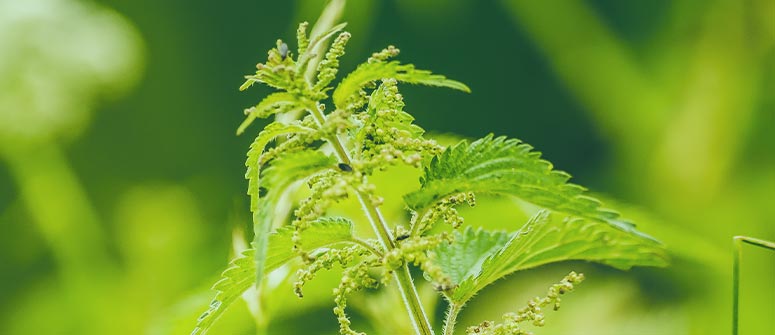
If you ever fell on a stinging nettle as a kid, you'll know just how painful these plants can be. Stinging nettles (sometimes just called nettles or "stingers") belong to a species of herbaceous perennials called Urtica dioica. Nettles were originally native to Europe, parts of Asia, and western North Africa, but can now be found all over the world. Besides producing an inflammatory response when they come into contact with the skin, stinging nettle actually has a rich history in many cultures both as a holistic herb and culinary ingredient. Moreover, nettles make a great addition to the garden, especially when grown alongside weed plants.
How do nettles benefit nature?
Despite often being regarded as a nuisance or weed, stinging nettles play a variety of environmental roles. Out in nature, nettles feed birds, caterpillars, and other insects, helping to sustain a rich ecosystem. Similarly, nettles make great companion plants in the garden, helping to attract beneficial insects and animals. Nettles like to grow in well-aerated soil that's rich in phosphorus and nitrogen, meaning a thriving stinging nettle population is a good sign of soil fertility. Finally, nettles are naturally rich in nitrogen, which they pass back into the soil when they die or are thrown onto compost piles.
What are companion plants?
Companion planting is a tried and tested gardening/agricultural technique that aims to create a healthy ecosystem for a particular crop, such as cannabis. By growing a crop alongside other types of plants, such as those that can help to stave off predators and/or improve soil quality, the quality and viability of the crop can be enhanced or protected. Vegetable gardeners, for example, often grow non-edible plants around their vegetable patches in order to protect their fruits/veggies against pests/pathogens, or to introduce pollinating insects into the area.
As weed growers, we can use companion plants in the same way to create a better ecosystem for our cannabis crops—an ecosystem rich in high-quality soil, insects, and other life forms that help our plants reach their full potential.
What are the benefits of stinging nettles in your outdoor cannabis garden?
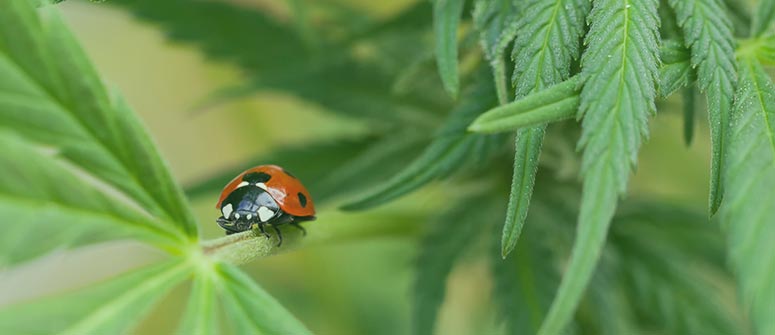
As mentioned, nettles benefit nature in many ways, which is why they're often utilised by amateur gardeners or even in professional agricultural settings. For outdoor cannabis growers, growing some nettles alongside your marijuana plants can have many benefits.
1. Attracting beneficial insects and animals into your garden
Nettles create a breeding ground for caterpillars, moths, and even ladybugs; pollinated nettles also attract birds (which like to eat nettle seeds). Attracting birds and beneficial insects into your cannabis garden is one of the best ways to keep your plants protected against pests such as ants, spider mites, thrips, and more.
2. Adding nutrients to compost
Nettles make a great addition to your compost pile, as they're rich in nitrogen. If you don't have a lot of nettles growing in your garden, consider foraging for them in a nearby park or reserve. Remember to add nettles to your compost heap along with brown waste, such as dry leaves and twigs, dead and dry plants, and even cardboard. When all is said and done, you'll have a rich source of compost you can add directly to your substrate or use to make compost tea.
3. Making a rich fertiliser tea / foliar spray
Besides composting them, you can also use stinging nettles to make a nitrogen-rich fertiliser tea. To do so, just follow these instructions:
- Collect enough nettles to fill a bucket. To harvest nettles, cut them at their main stem, roughly 3cm above the soil. Use gardening gloves to handle the nettles, and don't pick old plants or those producing seeds.
- Use garden shears to chop the nettles inside the bucket. Fill the bucket with clean, unchlorinated water roughly 5cm from the top.
- Cover the bucket, and put it in a sunny spot in your garden. Stir every 2 days. As the tea brews, it will bubble and smell fairly unpleasant.
- After about 2–3 weeks (depending on the temperature in your area), your nettle fertiliser tea will be ready. Dilute 1 part tea in 10 parts unchlorinated water, and use the mixture as a regular root-applied fertiliser. Alternatively, dilute the 1 part tea in 20 parts water with a dose of insecticidal soap, and use as both a foliar spray and for pest control.
4. Potentially boosting the terpene production of your plants
While there is no scientific research to prove this, some veteran cannabis growers (especially those inclined to apply organic and permaculture techniques in their gardens) swear that growing stinging nettles near cannabis plants can improve the latter’s terpene production. These individuals suggest that it has something to do with the pollen produced by male nettle plants, which is also used, anecdotally, to enhance flavour in fruit and vegetable growing.
5. Camouflaging your cannabis plants
Stinging nettles can grow up to 2m tall and, as mentioned, are commonly found all over the world. If you're an outdoor gardener trying to keep your cannabis plants out of sight, growing a few large nettles can be a great way to camouflage your green ladies. From a distance, at least, nettles and cannabis can look similar to the untrained eye.
Secondary benefits of growing nettles in your cannabis garden
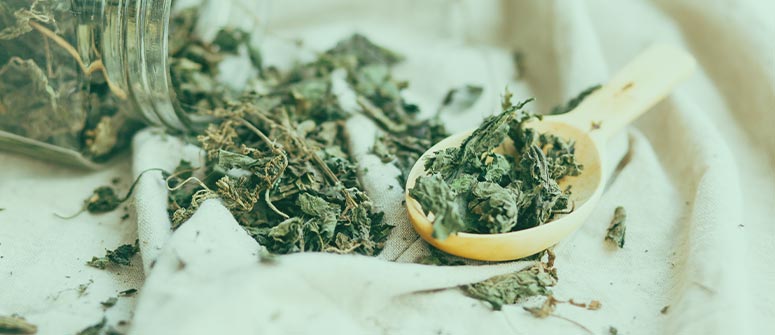
Aside from the above, here are a couple of nettle benefits outside the realm of gardening.
- Nettles as food: Stinging nettles lose their sting when boiled or cooked, and actually have a history of being used in a variety of culinary applications, particularly in Europe. With a texture and flavour very similar to spinach, you can include stinging nettles in soups, purees, sauces (such as pesto), and much more. Nettles are also highly nutritious, containing large amounts of protein and even carotenoids.
- Nettles as medicine: Stinging nettles can be used to make antihistamines used to treat allergies. Nettle preparations (such as tea) are also thought to potentially help with inflammation, and work as a diuretic.
How to grow stinging nettles in your cannabis garden
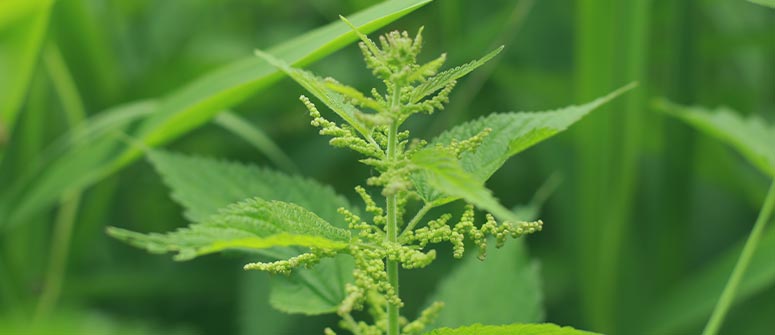
Growing stinging nettles in your outdoor cannabis garden is easy. To introduce them, consider:
- Digging up a few plants from a friend's garden, or foraging for some in a forest, park, or reserve (with permission, of course).
- Foraging for seeds from flowering nettles and sowing them in your garden.
Once established, nettles tend to grow very quickly. They are a hardy plant that can thrive in a variety of different climates, but they love well-aerated soils rich in nitrogen and phosphorus. Nettles also like moist (but not wet) growing conditions, so you may want to water them more regularly than you water your cannabis plants. Consider using mulch to insulate your soil and help it retain moisture, and grow your nettles in full sun if possible. Nettles can tolerate partial shade, but will take basically all the sun they can get.
Controlling the growth of stinging nettles
Nettles need essentially no maintenance to grow in most gardens. In fact, you might find that your nettles become a bit invasive or dominant after a while. To deal with this, regularly prune your nettles (they'll grow new, young offshoots where they're pruned), and don't be afraid to pull out whole plants to help keep your nettle population under control.
Note that nettles will naturally wilt and die in winter, re-emerging in the spring.
Nettles and cannabis: A match made in heaven
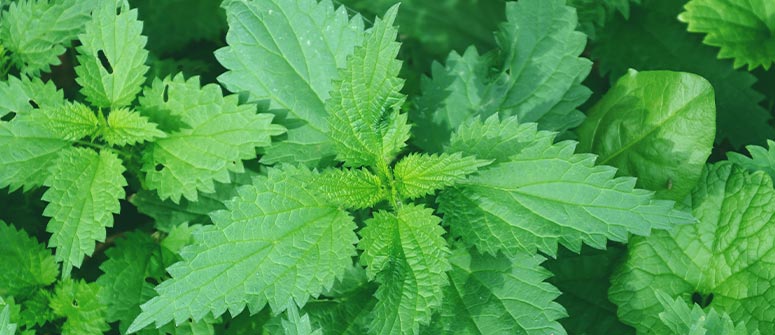
Stinging nettles, while often thought of as a nuisance due to their sting, can make a great addition to your cannabis garden. They work wonders as companion plants, can grow large enough to camouflage cannabis, and may even boost the terpene production of your buds. Finally, nettles also make a nutritious food or natural remedy, as well as great fertiliser. Especially for those seeking a free, environmentally conscious way to enhance their outdoor cannabis grow, stinging nettles are a no-brainer.




